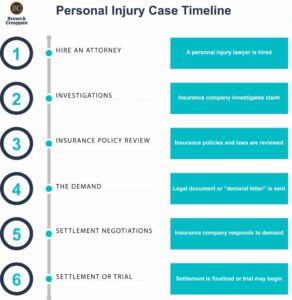INSURANCE CLAIMS VS. LAWSUIT
- Insurance claim. Most cases begin as insurance claims. After an accident, your lawyer negotiates with the insurance policy responsible for covering your damages. If the parties agree to terms, the case settles, and no lawsuit needs to be filed.
- Lawsuit. If a settlement cannot be reached in a timely fashion, your lawyer may need to file a lawsuit. This is a formal process where paperwork is filed in the courthouse.
TERMS YOU’LL HEAR DURING AND AFTER THE INSURANCE CLAIM PROCESS
- Medical payments (“med pay”). This no-fault coverage, usually several thousand dollars or less, pays for medical and funeral expenses from an accident. Med pay covers these expenses regardless of who was at fault. It is an add-on to most insurance policies.
- Subrogation. Subrogation is when one insurance company pursues another insurance company to receive some of the money from the settlement. For example, a health insurance policy that covered medical treatment for the victim of an auto accident may file a subrogation claim against the at-fault driver’s insurance policy.
- Uninsured motorist. This pays for the injuries of you and your passengers, potentially up to the policy limits, if an uninsured motorist causes the accident.
- By law, uninsured motorists have usually included in state minimum (a/k/a/”liability-only”) policies.
- It does not cover the damage to your vehicle.
- Underinsured motorist coverage. This applies when the driver that caused your accident has insurance coverage, but it is not enough to pay for your injuries. Underinsured is an add-on to an insurance policy. Consumers need to specifically ask for it to be added to their policy.
- Damages. This is a legal term used for monetary losses incurred when another party’s negligence injures one party. There are different types of damages.
- Compensatory damages. Also referred to as “actual damages.” It is the monetary value of what a plaintiff lost or incurred because of the injury. Typical compensatory damages in an injury claim include medical bills, lost wages, and out-of-pocket costs for things like prescriptions and medical equipment.
- Non-economic damages. These are the losses that do not have an initial monetary value. They can include such things as pain and suffering, mental or emotional distress, loss of consortium, and/or loss of enjoyment of life.
- Punitive damages. These are damages designed to punish a wrongdoer and are typically only awarded by a judge or jury.
TERMS YOU MAY HEAR DURING LITIGATION
Once you file a lawsuit, your case is “in litigation.” Once litigation begins, you may hear a whole new crop of legal terms.
- Comparative negligence. In states with relative negligence laws, blame might be allocated among the parties, and a settlement or jury award may reflect that allocation.
- Contributory negligence. In states with contributory negligence laws, the injured party may be prevented from collecting any damages after an accident if they are partially to blame for the accident.
- Defendant. A party who is defending against a legal claim.
- Demand. A list of requirements to settle a case is sent to the opposing party.
- Discovery: Even though the Big Courtroom Reveal is a popular trope in television and movies, such surprises are counterproductive in real life. Instead, the parties gather and exchange information through the discovery process. Discovery allows everyone to figure out their best options, whether dismissing the case, settling it, or taking it to trial. The most common types of discovery are as follows:
- Interrogatories. A list of questions from one side that the other side must answer or object to in writing.
- Requests for production of documents. A list of written submissions to obtain relevant documents the other side may have within their control.
- Deposition. A party to a case is questioned outside of court and under oath.
- Mediation: A process where a neutral third person (the “mediator”) helps the parties discuss the issues to resolve the dispute before going to trial. Some things to know about mediation include:
- Although mediation might be required either by contract or by the court, the process is considered “voluntary” because mediation does not require the parties to come to an agreement.
- The mediator does not have the power to actually decide the issues in the case. However, should the parties reach an agreement, the mediator may reduce the agreement to writing, which might be enforceable in court.
- Next Friend. A person who appears in court on behalf of somebody who is not competent to bring a lawsuit on their own, usually a minor or a person who is legally incapacitated. For example, parents often act as Next Friend if their minor child has been injured.
- Plaintiff. The person who initiates a lawsuit against another party.
- Statute of Limitations: The amount of time the law allows to file a lawsuit. These vary widely by state and case type.
- Third-party claim/litigation. Sometimes a party who was not directly involved in the accident may still share some of the blame and may be brought into the case as a third-party litigant.
Your personal injury lawyer at Brown & Crouppen is here to help you understand your case. If you ever have any questions about anything, do not hesitate to contact us.








